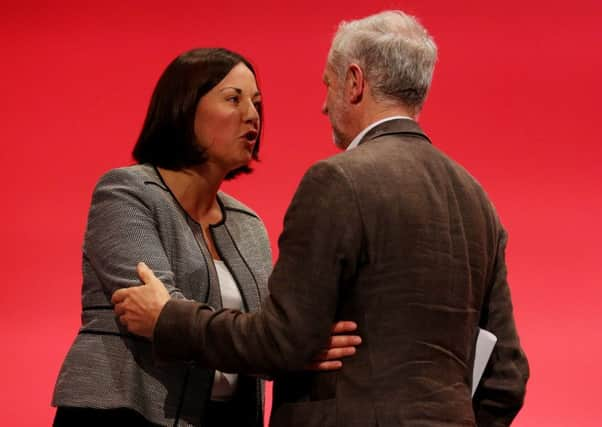Labour without Trident policy by 2016 elections


The UK Labour leader added to the confusion surrounding Labour’s stance on the nuclear weapons system when he met with MSPs in Edinburgh.
His first visit north of the border after his election as party leader was dominated by Trident, following his declaration that he would never use Britain’s nuclear deterrent.
Advertisement
Hide AdAdvertisement
Hide Ad“What about Trident, Jeremy?” a scrum of journalists shouted at him as he made his way from the Scottish Parliament to a nearby cafe.
Besieged by journalists and passers-by, Mr Corbyn doggedly dodged the questions until he reached the Serenity cafe to be interviewed by the BBC.
“I think the people of Scotland know what my position is on Trident,” Mr Corbyn told his BBC interviewer before adding that the issue would be debated at the Scottish Labour Party conference at the end of October.
When asked if he could promise that Labour would unite behind a clear policy before the Scottish elections in May next year, he answered: “We hope that the debate had moved on to some kind of conclusion by then.”
When pressed on whether he could guarantee a settled position by then, Mr Corbyn replied: “No, not really, because it would be unfair to be boxed into a timetable.”
Mr Corbyn’s comments were criticised by First Minister Nicola Sturgeon, who said: “Their policy on Trident is a complete and utter mess.
“Surely they have got to make absolutely clear one way or another exactly where they stand on this.”
Mr Corbyn came to Scotland in the aftermath of May’s disastrous election for Labour, which saw its party lose 40 of its 41 seats.
Advertisement
Hide AdAdvertisement
Hide AdHe came to Edinburgh to meet the Scottish Labour leader Kezia Dugdale, one of many senior Labour figures who takes a different view from the UK leader’s unilateral approach the nuclear weapons based on the Clyde.
In the past, Ms Dugdale has indicated that she favours a multilateral position – the UK only giving up its arsenal if other nuclear powers agreed to do the same.
When asked about her stance yesterday, Ms Dugdale said that the issue would be discussed at the Scottish Labour Party conference in Perth later this month.
Earlier this week Mr Corbyn was criticised by members of his Shadow Cabinet when he indicated that he would not be prepared to press the nuclear button – a comment that undermined the idea that Trident could be used as a deterrent.
The Shadow Defence secretary Maria Eagle said Mr Corbyn had “undermined to some degree” the review she was carrying out on Labour’s defence policy.
She also said she did not think a potential Prime Minister should have made such a remark. While the Shadow Foreign Secretary Hilary Benn said a Prime Minister should have the option to launch a nuclear strike.
More criticism came from Sir Paul Kenny, the leader of one of Britain’s biggest trade unions, who suggested that Mr Corbyn would be unable to lead the country having said he would never use nuclear weapons.
Sir Paul, the General Secretary of the GMB, said there was already a “lot of debate” around Mr Corbyn’s leadership and whether he could take the party into the 2020 election.
Advertisement
Hide AdAdvertisement
Hide AdThe leader of one of Britain’s biggest trade unions has warned Jeremy Corbyn he may be unable to take on the role of prime minister after the new Labour leader said he could never launch a nuclear strike.
Sir Paul Kenny, the general secretary of the GMB, said there was already a “lot of debate” around Mr Corbyn’s leadership and whether he could take the party into the 2020 general election.
Sir Paul said Mr Corbyn’s anti-nuclear stance would be incompatible with being Prime Minister if Labour remained committed to its current position of multilateral disarmament.
“That may well be right,” he said. “At the end of the day, if you are in that role and the party is multilateral and that is the position you are elected to the country, then maybe somebody else should be given the (nuclear) button.”